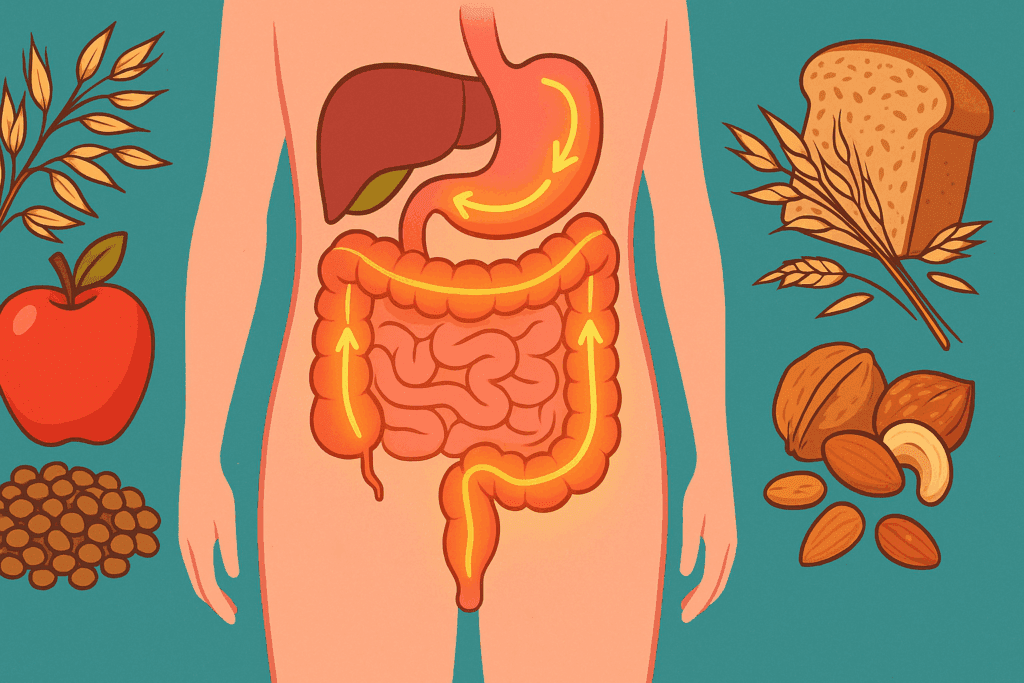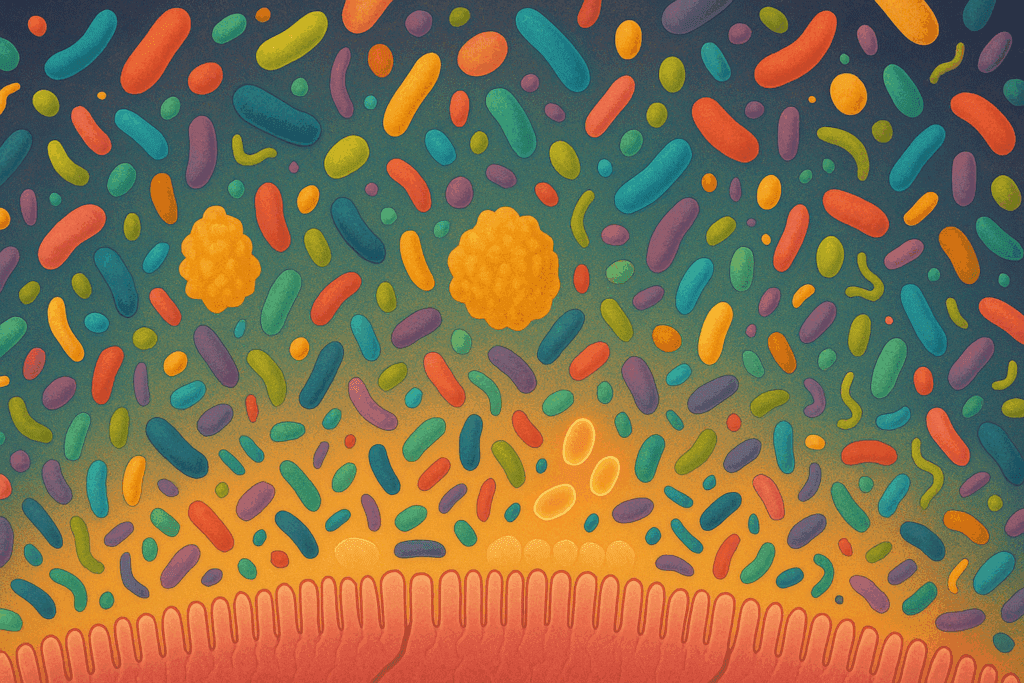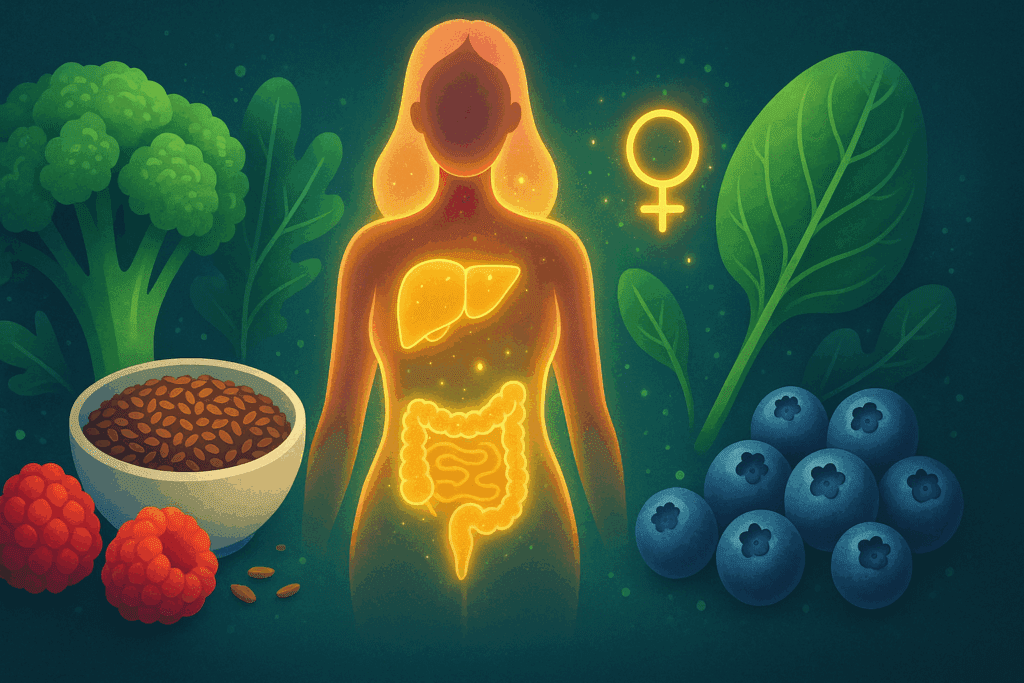Understanding why fiber is important to your body begins with recognizing the role it plays in nearly every aspect of your digestive and metabolic health. Dietary fiber is not simply a filler in your meals; it is a cornerstone of gut health and plays a central role in cardiovascular function, blood sugar regulation, and even mental clarity. For a college-educated reader seeking to optimize both short-term wellness and long-term disease prevention, this essential guide delves into the mechanisms, benefits, and practical strategies for mastering daily fiber consumption with scientific integrity and actionable insight.
You may also like: The Ultimate Guide to Gut Healthy Meals: Best Meals for Gut Health and Nourishing Recipes You’ll Love

The Fundamentals of Fiber: What Does Fiber Do for the Body?
Fiber, in its most basic form, is the indigestible portion of plant foods that passes through the digestive system largely intact. Yet, its influence is anything but passive. What does fiber do for the body? At a cellular and systemic level, it modulates the rate of digestion, supports the gut microbiome, aids in nutrient absorption, and helps maintain bowel regularity. Soluble fiber dissolves in water to form a gel-like substance, slowing down digestion and helping regulate blood glucose and cholesterol levels. Insoluble fiber, by contrast, provides bulk to stool and accelerates intestinal transit, reducing the risk of constipation and promoting detoxification.
One of the lesser-discussed but highly impactful benefits is how fiber feeds beneficial gut bacteria. This process, known as fermentation, occurs primarily in the colon and results in the production of short-chain fatty acids (SCFAs) like butyrate. SCFAs nourish colonocytes, reduce inflammation, and improve immune function. Thus, fiber is not merely a digestive aid; it is a metabolic enhancer and immune regulator.
Why Fiber Is Important for Your Body: Exploring Systemic Benefits
To fully appreciate why fiber is important for your body, consider its multi-organ effects. High-fiber diets are linked with reduced risk of coronary heart disease, stroke, type 2 diabetes, and certain cancers, particularly colorectal cancer. One reason for these protective effects is fiber’s ability to improve lipid profiles by lowering low-density lipoprotein (LDL) cholesterol. Soluble fiber binds to bile acids in the gut, promoting their excretion and forcing the liver to convert more cholesterol into bile, thereby lowering serum cholesterol levels.
Fiber also plays a critical role in glycemic control. By slowing carbohydrate absorption, it reduces postprandial blood sugar spikes and improves insulin sensitivity over time. This is particularly crucial in the context of the growing prevalence of metabolic syndrome and type 2 diabetes in developed nations. Furthermore, dietary fiber benefits cognitive function through the gut-brain axis. SCFAs have been shown to influence neurotransmitter synthesis and reduce systemic inflammation, which is increasingly recognized as a contributor to mood disorders and neurodegeneration.

How Much Fiber Should You Have a Day? Understanding Guidelines and Variability
When asking how much fiber should you have a day, it’s important to distinguish between general recommendations and individualized needs. For healthy adults, the suggested daily fiber intake ranges between 25 to 38 grams, depending on age, sex, and caloric intake. Specifically, fiber per day for a woman is typically recommended at 25 grams, while men are encouraged to consume around 38 grams. However, most individuals fall significantly short of these targets, with the average fiber intake per day hovering around 15 grams in Western populations.
These recommendations encompass both soluble and insoluble fibers. Understanding how much soluble fiber per day you need is crucial for managing cholesterol and blood sugar, while knowing how much insoluble fiber per day you require helps promote regularity and gastrointestinal health. For balanced benefits, a 1:3 ratio of soluble to insoluble fiber is generally advisable. Still, individual responses may vary based on gut microbiota composition, physical activity, and pre-existing conditions such as irritable bowel syndrome or inflammatory bowel disease.
Why Fiber Is Important for Gut Health: Microbiome Modulation and Beyond
Gut health has become a central focus in modern nutritional science, and fiber’s role cannot be overstated. The colon is home to trillions of microbes that rely on dietary fiber for sustenance. When we ask what part of the body does fiber help, the colon stands out as the epicenter of fiber’s transformative power. Fiber acts as a prebiotic, stimulating the growth of beneficial bacteria like Bifidobacterium and Lactobacillus. These microbes, in turn, ferment fiber to produce SCFAs, which help maintain the integrity of the gut lining and regulate immune responses.
A fiber-deficient diet can lead to dysbiosis—an imbalance in gut flora associated with inflammatory diseases, mood disorders, and even autoimmune conditions. Daily fiber consumption thus supports a diverse and resilient microbiome, which is essential for everything from digestion to mental well-being. The importance of fiber in this context is not merely preventive but restorative, making it an essential element of any gut-healing protocol.

How Many Grams of Fiber Per Day? Translating Science into Practice
The technicalities around how many grams of fiber per day one should consume often leave people feeling overwhelmed. Yet translating this into real food terms can demystify the process. A bowl of oatmeal, a cup of lentils, a pear, and a handful of almonds can easily provide over 20 grams of fiber. Still, achieving the suggested daily fiber intake requires intentionality. When planning meals, aim to include at least one fiber-rich food in every eating occasion.
The question of how much fiber should I eat a day must also consider food quality and preparation. Whole foods retain their fiber matrix, while processed foods, even those labeled “high in fiber,” may contain isolated fibers with limited physiological benefit. Furthermore, it is essential to ask why do you need to ease into fiber intake? A sudden increase can lead to bloating, gas, and cramping, as the gut adjusts to increased fermentation. Gradual introduction with adequate hydration is key to a smooth transition.
Why Fiber Is Important in Disease Prevention and Longevity
As we age, our susceptibility to chronic diseases increases, but dietary fiber intake per day can be a decisive factor in mitigating these risks. Fiber’s effect on cholesterol, blood sugar, and weight management is well-documented, but its influence on longevity is only recently gaining attention. Epidemiological studies consistently show that individuals with higher fiber intake live longer and have lower incidence of age-related illnesses. This longevity benefit stems from fiber’s systemic anti-inflammatory effects and its ability to support metabolic efficiency.
Fiber for women carries particular significance due to hormonal influences on digestion and cardiovascular risk. During menopause, for instance, the risk of heart disease increases, and fiber can help modulate lipid profiles and maintain insulin sensitivity. Moreover, fiber supports estrogen detoxification in the liver and gut, offering potential benefits in hormone-dependent cancers. Hence, fiber per day for a woman is not just a guideline—it is a strategic tool for lifelong wellness.

Why Fiber Is Important for Your Body: Insights from the Gut-Brain Axis
In recent years, the interplay between gut health and brain function has captured the scientific community’s attention. One cannot truly understand why fiber is important for your body without considering the gut-brain axis. The microbiome communicates with the brain via the vagus nerve, endocrine signaling, and immune pathways. SCFAs produced by fiber fermentation have been shown to influence serotonin and dopamine production, thereby affecting mood and cognitive function.
Chronic inflammation, often stemming from poor gut health, is implicated in depression, anxiety, and neurodegenerative diseases. Thus, the dietary fiber benefits extend beyond digestion and cholesterol management to include mental health support. Including fiber-rich foods like chia seeds, flaxseeds, legumes, and leafy greens in your daily routine may help regulate mood and improve stress resilience through microbiome modulation.

Provide 2 Reasons Why Having High Fiber Diet Is Important for Metabolic Health
There are many compelling reasons to prioritize fiber, but if we were to provide 2 reasons why having high fiber diet is important, they would be blood sugar regulation and weight management. High-fiber foods slow the absorption of glucose into the bloodstream, preventing rapid spikes and crashes that contribute to insulin resistance over time. This regulation is crucial for individuals at risk of or living with type 2 diabetes. The slow-digesting nature of fiber also enhances satiety, leading to reduced caloric intake and better portion control, which are vital for weight maintenance.
These mechanisms work synergistically. Stable blood sugar levels help prevent cravings and overeating, while enhanced satiety reduces the need for frequent snacking. This dual-action benefit not only supports weight control but also reduces systemic inflammation, a common denominator in metabolic syndrome. The g of fiber per day needed to reap these benefits falls within the standard recommendation of 25 to 38 grams, but even incremental increases can yield measurable improvements.
Why Is Fiber Good for You in the Context of Heart Health?
Cardiovascular disease remains a leading cause of death globally, and dietary strategies to mitigate this risk are a public health priority. So why is fiber good for you in this context? Soluble fiber reduces LDL cholesterol by binding to bile acids and promoting their excretion. This reduces the recirculation of cholesterol in the body and encourages hepatic uptake of LDL from the bloodstream. Moreover, fiber helps regulate blood pressure by improving endothelial function and reducing arterial stiffness.
Daily required fiber intake supports the optimal function of the cardiovascular system, and exceeding these recommendations can further enhance protective effects. In populations where average fiber intake per day is higher due to diets rich in whole grains, legumes, fruits, and vegetables, rates of heart disease are significantly lower. Fiber’s role in lipid modulation, glucose metabolism, and weight control creates a trifecta of cardiovascular benefits that underscore its essential place in a heart-healthy diet.

Is It OK to Drink Water with Fiber In It? Navigating Supplements and Hydration
As people explore ways to increase fiber intake, questions often arise about the safety and efficacy of supplements. Is it ok to drink water with fiber in it? The answer is generally yes, especially when using soluble fiber powders like psyllium husk. These supplements can be a practical addition for individuals struggling to meet their daily targets through food alone. However, hydration is paramount. Fiber absorbs water to exert its bulking effects, and inadequate fluid intake can lead to constipation rather than relief.
Fiber supplements should not replace a diet rich in whole foods, which provide not only fiber but also antioxidants, phytonutrients, and essential vitamins. Nevertheless, when used appropriately, they can help bridge nutritional gaps, particularly during travel or periods of dietary restriction. Always begin with small doses and gradually increase while monitoring for gastrointestinal discomfort. Consult a healthcare provider if you have pre-existing conditions like diverticulitis or Crohn’s disease before introducing fiber supplements.
Why Fibers Are Important for Hormonal Health and Detoxification
Beyond digestion and disease prevention, fiber plays a lesser-known role in hormonal balance and detoxification. Estrogen is metabolized in the liver and excreted via the digestive tract. Insoluble fiber binds to excess estrogen and other endocrine-disrupting compounds, facilitating their removal and preventing reabsorption. This process is critical for reducing the risk of hormone-sensitive conditions such as breast and ovarian cancer.
Fiber also supports liver detoxification pathways, indirectly aiding in the clearance of xenobiotics and metabolic waste. Individuals with sluggish digestion or chronic constipation may experience hormone imbalances, skin issues, and fatigue—symptoms that can often be alleviated through improved fiber intake. This hormonal-regulatory role adds yet another dimension to the importance of fiber in comprehensive wellness protocols.
How Much Fiber Per Day for a Woman: Life Stage Considerations
While general guidelines suggest 25 grams per day, how much fiber per day for a woman may change with age, activity level, and reproductive status. Pregnant women, for instance, require additional fiber to support increased blood volume, prevent gestational diabetes, and manage constipation. Postmenopausal women benefit from higher fiber to regulate cholesterol and support hormonal detoxification.
Fiber for women should ideally come from a wide array of sources to ensure a broad spectrum of phytonutrients. Fruits, vegetables, legumes, seeds, and whole grains each offer unique fiber profiles that collectively enhance gut diversity and systemic health. Individual tolerance may vary, and women with certain gynecological or digestive conditions may need personalized recommendations. Nonetheless, prioritizing dietary fiber intake per day can be a powerful tool for navigating the hormonal fluctuations and metabolic shifts that characterize different life stages.
Frequently Asked Questions: The Essential Guide to Daily Fiber Consumption
Why Fiber Is Important for Your Body in Preventing Nutrient Deficiencies
While many people understand that fiber aids in digestion, fewer realize that it indirectly supports the absorption of essential nutrients. One of the reasons why fiber is important is its role in maintaining the integrity of the gut lining. A healthy intestinal barrier ensures efficient nutrient absorption, minimizing the risk of deficiencies in critical vitamins and minerals. Moreover, by supporting a diverse microbiome, fiber enhances the production of certain nutrients like vitamin K and B vitamins through bacterial synthesis. Thus, when discussing what part of the body does fiber help, it’s clear that the digestive system is not the only beneficiary—the entire body gains from improved nutrient bioavailability.
How Much Soluble Fiber Per Day Is Ideal for Cognitive Health Support?
Emerging research suggests that soluble fiber may have cognitive benefits beyond its known role in cholesterol control. While there’s no fixed number for everyone, aiming for around 5 to 10 grams of soluble fiber per day appears beneficial for brain health. This specific amount supports the production of short-chain fatty acids like butyrate, which can cross the blood-brain barrier and help reduce neuroinflammation. Such biological activity provides one explanation for why fiber is good for you when considering mental clarity and emotional regulation. Including soluble fiber sources such as oats, apples, and legumes can form part of a holistic strategy to promote neurological wellness.
Why Do You Need to Ease Into Fiber Intake, Especially During Lifestyle Changes?
Many people overlook the necessity of a gradual approach when increasing daily fiber consumption. The digestive tract needs time to adapt to the increase in fermentation that occurs when more fiber is introduced. This is particularly important when undergoing lifestyle shifts like starting a new fitness regimen or transitioning to a plant-based diet. Easing in helps prevent uncomfortable symptoms like bloating or cramping, which may discourage individuals from continuing their progress. Understanding why do you need to ease into fiber intake reveals that success lies not only in quantity but also in pacing and preparation.
What Part of the Body Does Fiber Help Most During Aging?
As we age, our digestive efficiency, immune resilience, and metabolic flexibility decline—and this is where fiber becomes increasingly vital. One of the key reasons why fibers are important during aging is their support of the colon and overall gut function. A healthy colon improves waste elimination and reduces the buildup of toxins, which can otherwise accelerate aging. Furthermore, fiber helps regulate hormones and reduce systemic inflammation, which supports joint health, cardiovascular function, and cognitive longevity. For older adults, the question of how much fiber should you have a day should also consider these broader aging-related benefits.
Why Fiber Is Important for Your Body When You Are on a Weight-Loss Journey
For individuals actively trying to lose weight, understanding why fiber is important can dramatically influence their results. Fiber increases satiety without adding extra calories, which helps curb appetite and reduce total food intake. Beyond that, high-fiber foods slow the absorption of sugars, leading to steadier blood glucose levels and fewer energy crashes. The answer to how much fiber should I eat a day during weight loss may vary, but aiming for the higher end of the suggested daily fiber intake (closer to 38 grams for men and 25 grams for women) can yield optimal benefits. Choosing whole foods over fiber-fortified snacks ensures you’re also getting phytonutrients and antioxidants.
Can Daily Fiber Consumption Affect Hydration and Fluid Balance?
Fiber and hydration are closely intertwined, and ignoring one can compromise the benefits of the other. When fiber absorbs water, it forms a gel-like mass that aids in stool formation and transit. However, without sufficient fluids, fiber can actually worsen constipation and impair digestion. This highlights why it is ok to drink water with fiber in it, especially if you’re using powdered fiber supplements. Maintaining a consistent water intake while increasing g of fiber per day helps support kidney function and thermoregulation, particularly for athletes and highly active individuals.
How Does the Importance of Fiber Differ Between Soluble and Insoluble Types?
Both soluble and insoluble fibers serve unique physiological roles that are essential for full-body health. Soluble fiber primarily helps with metabolic control, lowering blood glucose and cholesterol, while insoluble fiber provides roughage that accelerates intestinal movement. The distinction matters greatly when asking how much insoluble fiber per day is needed for digestive efficiency or how much soluble fiber per day is best for reducing cardiovascular risk. A healthy balance, typically a 3:1 ratio of insoluble to soluble fiber, is ideal for most individuals. Diversifying your fiber sources ensures that you receive the complete spectrum of dietary fiber benefits.
What Does Fiber Do for the Body During High-Stress Periods?
Stress profoundly affects digestion, often leading to disrupted bowel movements and changes in appetite. One of the less-discussed but essential reasons why fiber is good for u during stressful times is its role in regulating the gut-brain axis. High-fiber diets increase the production of gut-derived serotonin, which influences mood and stress resilience. Moreover, fiber supports a healthy microbiome that can buffer the effects of cortisol on the body. This makes daily fiber consumption a critical component of stress management, especially when combined with mindfulness and other behavioral interventions.
How Many Grams of Fiber Per Day Do Athletes Need for Peak Performance?
Athletes often focus on protein and carbohydrate intake while overlooking fiber’s performance-enhancing potential. However, how many grams of fiber per day an athlete requires may differ based on energy expenditure and training intensity. Endurance athletes may benefit from up to 40 grams daily to maintain regular digestion and reduce inflammation, while strength athletes might need slightly less due to differences in gastrointestinal demands. Importantly, the average fiber intake per day among athletes tends to be lower than optimal, affecting both recovery and nutrient assimilation. Strategic planning can help meet the daily required fiber intake without interfering with performance goals.
Why Fiber Is Important in Holistic Approaches to Hormonal Health
Hormonal imbalances often arise from issues related to detoxification and metabolic regulation, and fiber plays a key role in both. One of the clearest reasons why fiber is important for your body is its ability to bind to and eliminate excess hormones, such as estrogen, through fecal excretion. This process reduces the risk of hormone-sensitive conditions like breast or prostate cancer. Additionally, fiber influences insulin sensitivity and leptin signaling, which are central to reproductive and metabolic hormone balance. When building a holistic supplement or nutrition plan, fiber for women especially should be prioritized to regulate the hormonal fluctuations associated with menstruation, pregnancy, and menopause.
The Critical Importance of Fiber: A Daily Investment in Whole-Body Health
To conclude, daily fiber consumption is far more than a digestive aid—it is a multifaceted health strategy grounded in science. For those wondering why fiber is important, the evidence spans cardiovascular protection, metabolic balance, immune resilience, hormonal regulation, and cognitive function. Understanding how many grams of fiber should you have a day and implementing those targets with a thoughtful blend of soluble and insoluble sources can yield transformative benefits.
Whether you’re navigating chronic illness, seeking preventive care, or simply aiming for optimal vitality, fiber deserves a central role in your nutritional approach. The average fiber intake per day may fall short of ideal, but with conscious planning and awareness of your body’s needs, it is entirely possible to meet and exceed the daily required fiber intake. From managing cholesterol to supporting the gut-brain axis, fiber remains one of the most powerful yet underutilized tools in our dietary arsenal. Embrace it fully, ease into fiber intake wisely, and reap the lifelong rewards of this remarkable nutrient.

